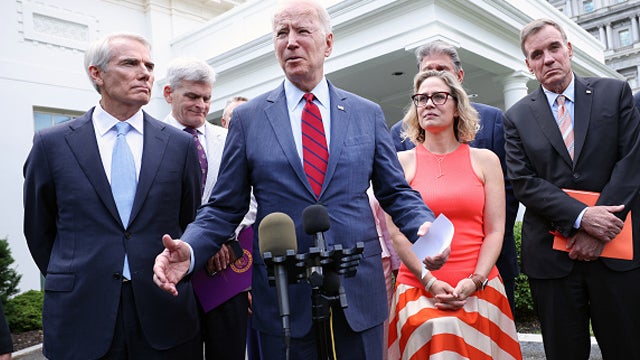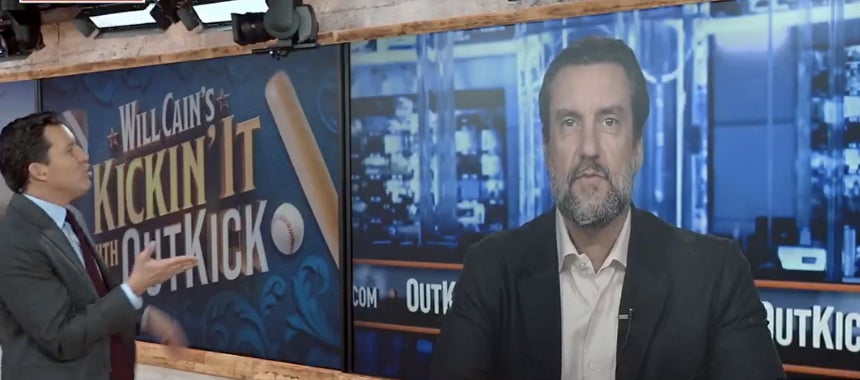Clay and Buck Break Down the Infrastructure “Deal”
25 Jun 2021
BUCK: Clay and I talked to you yesterday about the infrastructure deal that was at least agreed to in principle. This is bipartisan — 10 senators, a bipartisan group. You’ve got an agreement to spend, I mean, it’s gonna be roughly half a trillion. You know, no big deal. They’ve got that in the couch cushions, right?
I mean, who cares about having the printing presses just go and go with more and more cash getting spit out all the time? It’s not like inflation… Oh, no, inflation is already a problem, and it’s gonna get worse, by the way, but I want to just walk you through to look at a little bit of the back-and-forth that happened yesterday afternoon. At first Biden comes out, press conference, he’s all happy about it, and he goes we’ve got a deal. Play 23.
BIDEN: We had a, uhhh, really good meeting. In answer to your direct question, we have a deal, and, uhhh, I think it’s really important. We’ve all agreed that, uh, none of us got what we (sputtering) all that we w-wanted. I clearly didn’t get all I wanted.
BUCK: No one got everything they wanted. It sounds so moderate, doesn’t it? It sounds so much like Congress is doing the business of the people and Joe Biden, he’s taking a victory lap. The whole thing, it’s all… You almost get weepy about how promising this is for our republic.
The problem with it is that a couple of hours after that you had Joe Biden, the commander-in-chief, coming out to let everybody know that that whole bipartisan deal, he’ll actually kill it! He’ll kill it, he’ll veto it, unless the crazy left-wing wish list of Pelosi and the gang gets through as well through (chuckles) reconciliation. Play 2.
BIDEN: The bipartisan bill from the very beginning was understood, there’s gonna have be the second part of it! Not just signing the bipartisan bill and forgettin’ about the rest that I — that I proposed. I proposed a significant piece of legislation in three parts, and all — all — all three parts are equally important. (confused pause) And, by the way, my party, you keep… (sputtering) Everybody tell — t-t-t-tells me what my party is.
My party’s divided. Well, my party is divided. My party’s divided, but my party’s also rational. If they can’t get every single thing they want, but all that they have in the bill that — that … uh, before them is good, are they gonna vote “no”? I don’t think so.
BUCK: I love, Clay, this is what Democrats do. They redefine things. I would argue they’re redefining bipartisan to mean, “We agree on something; we go along.” This is Democrats and Republicans on this particular bill, at least in theory, right? This is all at the early stage. And then it is, but then we’re gonna ram through all the other stuff that you won’t go along with and say that the whole thing is bipartisan. It feels like a trap.
CLAY: It feels like a trap. It also feels like it isn’t in any way bipartisan and that the Republicans aren’t getting anything. That would be my question if we had these senators who have agreed to this infrastructure bill. What exactly is their game of chess that they are attempting to play here? Because strategically, let’s just kind of look at the broad scope here.
If they are dialing back what Joe Biden was going to spend on infrastructure, which it appears they are and they are somewhere meeting in the middle, but Joe Biden is simultaneously saying, “Unless I get everything else, basically, that I want in this other bill, then I’ll never sign this infrastructure bill,” strategically what have the Republican senators who have agreed to this actually accomplished?
Are they afraid…? And I would love to hear their rationale. Are they afraid that through budget reconciliation, that the Democrats are going to get everything and they’re not worried about Joe Manchin or Kyrsten Sinema or any of those people actually pulling out of the 50-vote majority with Kamala Harris breaking the tie, and so they’re trying to cut a trillion dollars in spending out through this?
I guess what I’m looking at is, to me, there has not been a very strong strategy elucidated for what the goal of the Republicans is here. The Democratic goal seems pretty clear. It’s that they can claim, as you said, Buck, that there is an element of bipartisanship here with the infrastructure element but then go ahead and ram through (chuckles) everything else that they want, and they can say, “See? We did bipartisan!
“The infrastructure bill is bipartisan,” and then in the $6 trillion budget that Bernie Sanders has put together with all of his wish list, they can then claim that they’re not subverting the democratic process in some way by using reconciliation on that $6 trillion. I mean, do you feel like, Buck, that we’ve gotten a good explanation of why it makes sense in any way to be bipartisan on this infrastructure package?
BUCK: Well, that’s a hundred percent true. It’s over half a trillion dollars on an infrastructure package when we’ve had to do all this spending already to get through covid, and then the Democrats already did the American Rescue Plan Act, which had all kinds of stuff in it. And just so everyone knows, what’s the part of this that Republicans won’t go along with?
‘Cause Democrats will say, “Well, they just wanted more money for roads and bridges,” right? So Republicans and Democrats on the bipartisanship piece of this, the infrastructure bill, it’s like, “Well, do you want the bridge to collapse under you? Do you want roads to be in terrible shape and you hit a pothole, it rips off your tire, maybe bends your alignment?”
 You know, no one wants that stuff, right? But then why won’t the Democrats just limit it to that? Well, because what they really want to throw in there is the radical Green New Deal, renewable energy stuff, and a lot of electric charging stations and child care and student loan forgiveness.
You know, no one wants that stuff, right? But then why won’t the Democrats just limit it to that? Well, because what they really want to throw in there is the radical Green New Deal, renewable energy stuff, and a lot of electric charging stations and child care and student loan forgiveness.
It just turns into an excuse. Republicans are gonna end up giving cover for Democrats doing what is essentially modern monetary theory, which is just spending whatever you think you need to spend. That’s what the theory really boils down to which AOC and others are essentially devotees of.
CLAY: And we still haven’t gotten what I think is the most significant part of this budget actually discussed very much, at least not in public. What’s gonna happen with the tax increases? Because I think there’s a ton of people out there listening to us right now that are wondering about that, too, because right now they’re talking about increasing the overall tax rate — crazily, to me.
And this is one of the things in this budget bill of many that I think deserves way more discussion. They are talking about making the capital gains tax retroactive, Buck. This has only happened once basically in American history. And this is me being involved in the business side of things. This is totally illogical.
They said, starting on April 28th — any deal that basically had not closed by April 28th — they’re going to double, effectively, the capital gains tax rate. But you know how long these deals take to work through. The idea that you can get a big deal down in a couple months or that you can retroactively go back and change the law as it pertains to people selling their stocks, as it pertains to people selling businesses, as it pertains to overall business decisions being made in general.
I don’t know how aggressively the Republicans are gonna try to hold the line on the 2017 Donald Trump tax decreases, both corporate tax and individual tax. But that’s the reason why the economy was on fire in a very positive way before covid happened. I think we need to go back in time a little bit and talk about the economy ’cause there’s gonna be a big argument here that we’re gonna have a Biden boom, right?
We’re gonna have a 7% growth rate or whatever the forecasts are gonna be in 2021. But remember, before the covid shutdowns, we had the lowest black, Asian, Hispanic, and white unemployment rates in the history of the country. We had the fastest growth that we had seen in forever. The Trump economic policies were on fire, Buck. And now we’re gonna go back and reverse those and just start throwing money like crazy it all of this government expenditure? It’s nonsensical.
BUCK: And you can already see what the narrative is gonna be. The same way that when… ‘Cause in many ways, this is the third term of the Obama administration, just with Biden —
CLAY: As the figurehead.
BUCK: — as the figurehead, right? And what you see here is the narrative — and there’s some historical luck in this, I guess you could say — that Obama comes into office after the Great Recession of 2008. In large part, I think you could say maybe won because of what happened in 2008, and then for the next two years it was, “Look where we were; look where we are now.”

Well, of course it’s going to be better. Unless you have the actual meltdown and collapse of the global economy, you’re going to come out of that recession, but it was the slowest recovery, as we know — the slowest recovery, in the first Obama term, since World War II. That was pretty remarkable data if you want look at how the Democrat plans actually played out and compare it to something.
But if you could just compare it to your worst month, it’s obviously going to look better, and there was a particular period there where the economy in 2008 was really shaky. Fast-forward to now. You had a covid artificial recession, essentially — a recession caused not by cyclical economic forces, not by people overspending on houses or the wrap-up of all the mortgages and the commodification of it by Wall Street.
What you had was people staying home because of covid. We all know, right? No one needs an explanation of that. We all just lived it. Well, anything is gonna be better than that. So what we have to do is make sure everyone sees that the argument here isn’t that the economy isn’t growing, because of course it’s gonna grow compared to 2020.
It’s, is it unnecessarily stalling out or dipping down and is inflation really starting to chip away at people who rely on wages and savings and trying to build savings? But that’s a tough case, especially when you have the media in your pocket. They’re just gonna say, “It’s better than 2020, isn’t it?”
CLAY: It’s also the case — and I think this is one that we need to continue to hammer — that there are 9.3 million open jobs right now, Buck. There are a lot of people out there listening to us running small businesses at work. They can’t open their restaurants. They can’t open their manufacturing plants for the full scope of what they would like to be able to accomplish.
 Because this is the most jobs we’ve ever had available in the history of this country: 9.3 million open. There are more open jobs than there are people seeking work. And we’re continuing to give people unemployment benefits such that in 19 blue states right now, an unemployed mom and a dad — couple, married couple — can make over $100,000 a year right now, Buck, by not working at all.
Because this is the most jobs we’ve ever had available in the history of this country: 9.3 million open. There are more open jobs than there are people seeking work. And we’re continuing to give people unemployment benefits such that in 19 blue states right now, an unemployed mom and a dad — couple, married couple — can make over $100,000 a year right now, Buck, by not working at all.
And so, to your point on the recovery and how limited is been in scope so far and how slowly it is moving, it’s because people are being incentivized not to work, which is slowing the overall engine. And, meanwhile, we’re pouring money in, which is why I think you can make a strong argument that while it may be the third term of the Obama administration, it’s also the second term of Jimmy Carter. Potentially we’re going back in time to what happened in the 1970s.
BUCK: I know it’s tough to get people that excited these days. (chuckles) And I don’t mean excited in a good way. I mean get them that engaged on the debt, which is gonna be $30 trillion before we blink our eyes, it feels like, and inflation. But just remember, monetary policy that leads to inflation like what we’re seeing?
Spending that leads to inflation, which is already happening, is, essentially, a tax on working-class people, middle-class people, their wages. They don’t own assets in the same way that those who are more well off do. Their wages go less far, prices hurt them more. This stings.
Recent Stories

Minneapolis ICE Shooting Fallout: Trump & Walz Try to Cool Tensions
Clay & Buck take a look at what comes next in Minnesota.

Karoline Leavitt Schools Press Corps with Immigration Truth
Karoline, as always, comes loaded with facts for the twisted media, including that Tom Homan is heading to Minnesota.

Law Enforcement Is Tough Business, But We Can't Pull Back on Deportations
Law and order is essential. But it's not pretty.

VIP Video: Clay & Buck Take Your Calls on the Minneapolis ICE Shooting
Clay and Buck opened up the phones to callers, many of which have law enforcement expertise.







